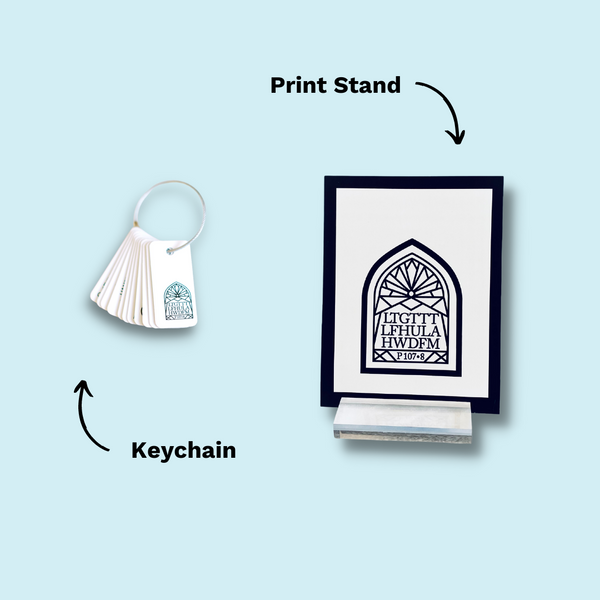Is faith merely a hopeful feeling? Or, is it something more?
Truly I tell you, if you have faith as small as a mustard seed, you can say to this mountain, "Move from here to there," and it will move. Nothing will be impossible for you.
- Matthew 17:20b
I'm thankful for all of God's words.
In their fullness, God's words tell us one big, breathtaking, cohesive story. They give us a depth of understanding about who he is, what life's all about, and how we can know him and thrive as people. But, what does that have to do with our verse about mountains?
EVERYTHING!
These few words that Jesus spoke have such beauty and significance, but when we take them out of the bigger context of Scripture, they can be misunderstood in harmful ways. As a major word nerd, I realize that you can quote people out of context to make even Mother Teressa look like a villain. So, context is crucial, especially with a verse like ours. (Read last week's post for more on how our sweet verse has been misunderstood and even misused.)
So, let's take in the whole story.
For our purposes today, I want you to just hear a story that might sound familiar to our regular readers. Remember our verse from back in April? It was Mark 9:24b, "I do believe, help me overcome my unbelief!" Well, that verse comes from Mark's version of this same story in Matthew. Jesus has just returned from a literal mountaintop experience where he'd revealed his glory to Peter, James, and John. He comes down the mountain to some frustrated disciples who've been trying without success to heal a boy who's been violently oppressed by an evil spirit. Jesus explains that their problem is rooted in unbelief. And, as if to illustrate their lack of faith, the boy's father asks Jesus, to heal his boy "if he can". To this Jesus replies, "If I can? Everything is possible for the one who believes." The dad realizes his own doubting heart and says, "I do believe, help me overcome my unbelief!" Then Jesus does the impossible thing that no one else could do, he "moves the mountain" that no one else could move, he banishes the evil spirit from the poor boy. The disciples are baffled saying, "Why couldn't we do that?" Jesus tells them in our passage from Matthew, "Because you have so little faith. Truly I tell you, if you have faith as small as a mustard seed, you can say to this mountain, ‘Move from here to there,’ and it will move. Nothing will be impossible for you." Mark's passage records a different response. In it Jesus says, "This kind can come out only by prayer."
So, what do we need? Faith or prayer? Yes. Both.
But, before we discuss our both/and situation, let's take a quick detour.
I know there're probably at least a few readers who are like, "Skrrrrt! Back up! How is it that Jesus answers one way in one account and another way somewhere else? Doesn't that prove that the Bible is unreliable and inconsistent?" Great question. Actually, the variation in these two accounts serves to prove the opposite. Let me explain how. You see, they show that two real people who really heard Jesus' answer decided to emphasize two different parts of Jesus' real answer when they retold the story. One person focused on how Jesus talked about having faith to move a mountain, and the other person emphasized how Jesus said that prayer was essential. Just like any conversation, there would have been all kinds of other things said. And, a true retelling would include whatever the teller wanted to emphasize, because they couldn't tell every last detail. In contrast, two made-up stories would look exactly the same, because they wouldn't be based on true remembrances. Moreover, such fabricated tales would have made the disciples look like heroes instead of prayerless, faithless failures. Real stories tell it like it is, even if people look bad or inconsistent. Manufactured stories look too good, too shiny, too perfect to be real.
But, let's get back to the main road.
I know I left you "living on a prayer", which will only get you "halfway there". And, according to Jesus you've also "gotta have faith, faith, faith." (Don't be jealous of my amazing 80s song references!) Seriously though, how are both faith and prayer the answer to the disciples inability to cast out an evil spirit? Are they even related? A good place to start is with how our culture currently uses and understands the word "faith". We say things like "just believe" or like that song goes, "you gotta have faith". Our secular culture likes the idea of having faith, but doesn't require an object of our faith. We can "have faith" without having "faith in" anyone or anything in particular. We use the idea of faith synonymously with a blind hopefulness, it's more of a positive mindset than a religious term. In a Biblical sense though, faith always has an object, God. Faith is trusting God, putting ourselves under his direction, believing that his ways are for our thriving. It's believing he is in control of everything, that he's powerful, all-knowing, good, and so on. So, if Biblical faith looks like believing in God, isn't Biblical prayer just an extension of that faith? Prayer is simply communicating with the God we're believing in.
So, what does this mean for us?
Well, it's pretty simple. It means that people of faith need to be people of prayer. Or to put it another way, we need to talk to God. We can't just say we believe in God and leave it at that. When we have mountains, and when we don't, we've got to be continually expressing our faith in God by talking to him. We need to invite him into the conversation, to listen to him in his word, to express our mustard-seed-sized faith and our unbelief just like that father did so many years ago. If we believe what we say we believe, then we need to act on that belief by talking to God each day. He is safe, he is good, and he wants to hear from us.
P.S. What this doesn't mean.
Like we stated last week, this verse doesn't mean that God is going to move every mountain we are asking him to move, or that it's because of our lack of faith that he isn't moving it. Again, see last week's post for the full discussion.
How can you make prayer a daily practice of expressing your faith in God?
How have you seen God answer your prayers of faith?
 Natalie co-founded Dwell with her sister, Vera. Together, they're committed to helping others connect with God each and every day. Natalie also hosts our weekly podcast, Dwell Differently. She and her husband, Jason, live in Chicago with their 5 kids, where Jason pastors First Free Church.
Natalie co-founded Dwell with her sister, Vera. Together, they're committed to helping others connect with God each and every day. Natalie also hosts our weekly podcast, Dwell Differently. She and her husband, Jason, live in Chicago with their 5 kids, where Jason pastors First Free Church.




